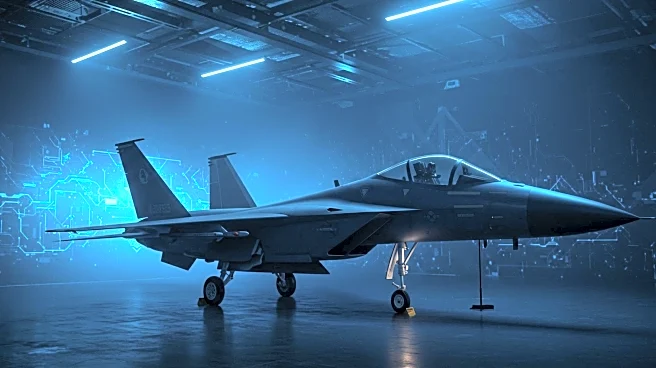What's Happening?
The Defense Advanced Research Projects Agency (DARPA) has awarded a $11.3 million contract to Systems and Technology Research to advance its Artificial Intelligence Reinforcements (AIR) program. This initiative aims to develop AI-driven algorithmic approaches for real-time distributed autonomous tactical execution in complex operational environments. The program is part of DARPA's broader effort to deploy unmanned combat aerial vehicles (UCAV) in air combat missions. Systems and Technology Research is the first company invited to phase two of the program, indicating its success in phase one, which involved creating fast and accurate models that improve with more data. The AIR program builds on DARPA's previous Air Combat Evolution initiative, which successfully allowed AI to control an F-16 and engage in dogfights against human pilots.
Why It's Important?
The advancement of DARPA's AI fighter jet program represents a significant shift in military technology, potentially transforming air combat operations. By developing autonomous systems capable of executing complex missions without human intervention, the program could enhance the U.S. military's strategic capabilities and reduce risks to human pilots. This development may also influence defense contracting, as companies like Systems and Technology Research, Lockheed Martin, and BAE Systems compete to innovate in AI-driven military applications. The program's success could lead to increased investment in AI technologies, impacting industries beyond defense, such as aerospace and robotics.
What's Next?
As DARPA progresses with phase two of the AIR program, Systems and Technology Research will conduct tests and simulations to meet benchmarks for producing uncrewed combat aerial vehicles. The agency plans to narrow its group of contractors from six to four, potentially involving other defense giants like Lockheed Martin and BAE Systems. Additionally, DARPA is expanding its autonomous capabilities to maritime environments, as evidenced by the recent christening of the USX-1 Defiant, an autonomous unmanned surface vessel. These developments suggest a broader push towards integrating AI across various military domains.
Beyond the Headlines
The ethical implications of deploying AI-driven combat systems are significant, raising questions about accountability and decision-making in warfare. As autonomous technologies become more prevalent, there will be increased scrutiny on the legal frameworks governing their use. Furthermore, the cultural shift towards unmanned systems may alter perceptions of military service and the role of human soldiers in future conflicts. Long-term, these advancements could lead to a reevaluation of international norms and treaties related to autonomous weapons.









